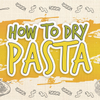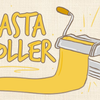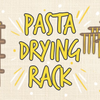Why Does Pasta Stick Together?
The main reason why pasta sticks together is due to the fact that during the cooking process, the pasta leeches starch molecules into the superheated water. This results in a sticky mess of gluten networks that bind the pasta together. This guide looks into the causes of pasta, sticking together, and ways to stop it from happening.
What Causes Pasta To Stick Together?
Adding oil to the pasta water can be well-intentioned, but its results are almost always negative- the oil coats the pasta strands preventing the sauce from adhering to the pasta. Tossing the pasta with a bit of oil after cooking to try and prevent it from sticking leads to similar results - oily pasta that cannot adhere to the sauce.
2.Using Too Little Water
Cooking pasta with too little water will result in sticky pasta. This is due to the fact that the scratch that leaches into the water will accumulate and coat the pasta strands in a thick layer of sticky starch that makes them stick together. When cooking pasta, always stick to the right ratios of water to pasta and salt- the most widely used ratio being 1:1:4 (1 pound of pasta to 1 tablespoon of salt and 4 quarts of water).
3. Adding The Pasta Before The Water Has Boiled
Adding pasta to the water before it has boiled will result in faster scratch leaching into the pasta water. This creates a sticky mess of starch that binds the pasta strands together. Adding the pasta to the cold water prevents the formation of the protective layer of stretch and gluten on the pasta strands, preventing further leaching of starch molecules into the water.
4. Not Adding Salt To The Water
Salt plays a vital role in the pasta cooking process - its presence in the boiling water allows it to act as an abrasive to the pasta’s surface. This prevents the pasta from becoming slimy during the cooking process, thus preventing the individual strands from sticking together. Adding enough salt to the pasta water should only be done before adding the pasta and ensure that the salted water is boiling once more before adding the pasta strands.
5. Cooking In A Small Pot
Cooking pasta in a small pot results in the over-accumulation of leached stretch molecules in a small space. These molecules become superheated and form stretchy bubbles and a thick coating of starch on the pasta strands, making them stick together. Cooking pasta in a large pot will reduce the possibility of over-accumulation of scratch foam and the sticky mess that it leaves behind. Read more on why pasta foams on our guide.
6. Undercooking Or Overcooking The Pasta
Overcooking pasta results in a sticky mess of limp and gummy pasta that doesn’t hold its shape. This is due to the over leaching of the starch from the pasta strands which leads to loss of firmness and excessive sticky stretch molecules on the surface of the strands. Undercooking pasta, on the other hand, leads to inconsistent firmness with some parts of the strands sticking together due to the lack of the protective layer of gluten that coats well-cooked pasta.
7. Not Stirring The Pasta
Not stirring the pasta often while it boils leads to overaccumulation of pasta foam on the upper layer. The foam prevents the hot vapor from escaping and instead gets trapped in bubbles- this superheats the pasta water leading to increased scratch leaching. The end result is a sticky mess of limp pasta coated with starchy slime. Stirring the pasta breaks the bubbles apart before the can over accumulate and prevent the hot vapor from escaping.
8. Rinsing The Pasta After Cooking
Rinsing the pasta after it's been cooked will wash away the protective layer of gluten on the surface of the individual strands allowing the scratch in them to stick to other strands. Ironically the reason why people rinse pasta after cooking is to try and prevent it from sticking together. Unfortunately, the results are entirely opposite and also prevent the pasta from adhering perfectly to the sauce.
Further reading material: link
8 Tips To Stop Your Pasta From Sticking Together
1. Stir The Pasta water
Stirring the pasta water as it boils ensures that all pasta strands are evenly cooked and also break up the sticky stretch foam as it forms. This prevents the accumulation of sticky bubbles that trap hot vapor within the surface of the pot. The stirring process also mixes the superheated starch preventing it from accumulating on the pasta strands, which would only make them stick together.
2. Use The Right Amount Of Water
A single pound of pasta requires at least 16 cups of water in order to cook al-dente, which refers to “firm to the bite” level of firmness. Using the right amount of water serves another significant role: it prevents the over-accumulation of leached starch in a small amount of water, which often leads to sticky pasta. Having enough pasta water in the pot thus serves to dilute the leached starch preventing its accumulation.
3. Use The Right Amount Of Salt
Using the right amount of salt increases its abrasive action on the cooking pasta, thus preventing every strand from becoming slimy. Only add pasta to the salty water after its boiling. This will increase the salt’s abrasiveness while also superheating the strands’ surface to form a protective layer of gluten and stretch that prevents further leaching of starch into the water.
4. Avoid Adding Oil To The Pasta Water
Avoid adding oil to the pasta water as this will only end up costing the pasta, which prevents it from adhering to the pasta sauce uniformly. The only time you can add olive oil to pasta is when you are serving it with oil-based soups.
5. Avoid Adding The Pasta Before The Water Has Boiled
Avoid adding the pasta strands before the water has boiled so as to reduce the amount of stretch that gets leached. It’s important to remember to wait until the water boils back up after adding salt before adding the pasta into the salty water. The boiling water scalds the pasta’s surface, giving it a protective layer of gluten and starch that prevents further leaching of starch into the pasta water.
6. Do Not Overcook Or Undercook The Pasta
Avoid overcooking the pasta as this will only increase the amount of leached stretch in the water that ends up locating the pasta with a sticky mess. Undercooking pasta, on the other hand, results in uneven firmness and the pasta continues to leach stretch even after it has been drained, creating a mass of sticky pasta. On average, a single pound of pasta should take about 8 to 12 minutes to cook in boiling salty water.
7. Do Not Rinse The Pasta
Do not rinse the pasta as this will only wash away the outer layer that prevents it from sticking together. Instead, use a large colander to drain the pasta and serve it immediately with the sauce or soup as per the recipe. The only time you are allowed to rinse pasta is if it’s going directly to the fridge for storage.
8. Use A Large Pot To Cook Pasta
You should always cook pasta in a large pot to give the hot vapor enough room to escape freely. This prevents the formation of sticky foam on the upper surface that results in increased starch leaching.
Further reading material: link
Stopping Pasta From Sticking When Storing
Mixing the pasta with a bit of the sauce will prevent it from sticking during storage. If you end up with pasta strands that are stuck together, you can sprinkle a bit of the sauce or water on the pasta before reheating it.
How To Keep Pasta From Sticking Together In Fridge
To prevent pasta from sticking together in the fridge, you can drizzle it with olive oil or toss it on a pan with melted butter, ensuring that the strands are coated well. Alternatively, you can give the pasta a quick rinse with cold water and drain in a large colander before sealing it in an airtight bag. Pasta can only remain fresh for up to 5 days in the fridge.
How Do Restaurants Keep Pasta From Sticking? Further reading material: link
Common Questions
Does Salt Prevent Pasta From Sticking
Yes, adding salt to the pasta water prevents the pasta from sticking by abrasing the stickiness on the pasta surface.
How Do You Keep Pasta From Sticking Together?
Cooking pasta the right way will prevent it from sticking together, and always remember to stir the pasta frequently while it cooks.
Why Does Salt Stop Pasta Sticking?
Salt acts as an abrasive agent to reduce the stickiness on the pasta strands, thus preventing the pasta from sticking together.
How Do You Unstick Pasta?
You can unstick pasta by reheating it with some sauce or sprinkling it with a bit of pasta water.
Should You Rinse Pasta?
You shouldn’t rinse pasta unless it’s going straight into cold storage as it will end up sticking together.
Why Is My Homemade Pasta Slimy?
Homemade pasta often gets slimy, depending on its stretch levels. Slimy homemade pasta can also be a result of overcooking or undercooking the pasta.
Should You Put Olive Oil On Cooked Pasta?
No, you should not put olive oil on cooked pasta as this will prevent it from adhering well with the pasta sauce.
Is Plain Pasta Healthy?
When consumed in controlled proportions, plain pasta can be considered to be healthy. However, avoid too much pasta as it's packed full of starch and carbs.
Does Pasta Increase Belly Fat?
When over consumed, pasta can contribute to increased belly fat as it has a substantial amount of starch and carbs, which get converted into fats for storage in the body.
Is Pasta Healthier Than Rice?
No, rice is healthier than pasta, thanks to its increased nutrient count and lack of gluten.
Does Pasta Make You Fart?
Yes, pasta is prepared using whole wheat flour, which contains cellulose- gut bio can break down cellulose in a process that makes you somewhat gassy.
Further reading material: link






